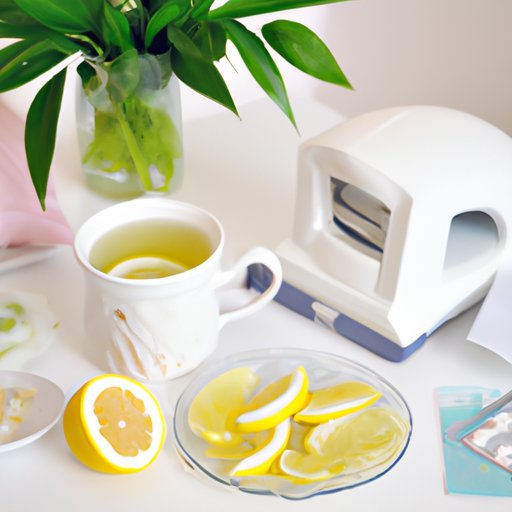
I. Introduction
Feeling bloated and gassy can be uncomfortable at best and downright painful at worst. But often, it’s not just something we have to put up with. There are many simple steps you can take to relieve and prevent bloating and gas. In this article, we’ll explore some of the most effective remedies and strategies for finding relief.
A. Definition of Bloating and Gas
Bloating refers to a feeling of fullness, tightness, or swelling in the abdomen, often accompanied by gas or abdominal pain. Gas, on the other hand, is the result of digestion and the breakdown of food in the gut. When gas builds up in the intestines, it can cause discomfort or pain.
B. Importance of Addressing the Issue
While bloating and gas are often just temporary nuisances, they can also be symptoms of underlying health issues, such as IBS or celiac disease. Additionally, chronic or severe bloating and gas can interfere with daily activities and negatively impact our quality of life.
C. Preview of the Topics to be Covered
In the following sections, we’ll cover 5 simple steps to beat the bloat, 7 natural remedies to relieve bloating and gas, 5 foods to avoid, the 3 best teas for fast relief, what not to drink, the benefits of probiotics, and gut-healthy recipes to help banish bloating and gas.

II. Say Goodbye to Bloating: 5 Simple Steps to Beat the Bloat
A. Stay Hydrated
Dehydration can make bloating and constipation worse, so it’s important to drink plenty of fluids. Aim for at least 8-10 glasses of water per day, and consider drinking herbal tea or coconut water for added hydration.
B. Exercise Regularly
Regular exercise can help improve digestion and prevent constipation, which can contribute to bloating. Aim for 30 minutes of moderate exercise, such as brisk walking or cycling, at least 3-4 times per week.
C. Practice Mindful Eating
Eating too quickly or while stressed can cause us to swallow air, which can contribute to bloating and gas. Instead, try to eat slowly and mindfully, paying attention to the taste and texture of your food. Additionally, avoid eating large meals and opt for smaller, more frequent meals throughout the day.
D. Watch your Fiber Intake
Fiber is important for digestive health, but too much or too little can contribute to bloating. Aim for 25-30 grams of fiber per day, and increase your intake gradually to avoid digestive discomfort. Additionally, consider opting for soluble fiber, found in foods such as oatmeal and beans, rather than insoluble fiber, found in foods such as leafy greens and raw vegetables.
E. Reduce Stress Levels
Stress can interfere with digestion and contribute to bloating and gas. Try to incorporate stress-management techniques such as yoga, meditation, or deep breathing into your daily routine.
III. 7 Natural Remedies to Relieve Bloating and Gas Today
A. Peppermint Oil
Peppermint oil is thought to help relax the muscles in the intestinal wall, allowing gas to pass more easily. Try adding a drop or two of peppermint oil to a glass of water or tea, or consider taking a peppermint oil supplement.
B. Ginger
Ginger has anti-inflammatory properties and can help soothe the digestive tract. Try drinking ginger tea or adding fresh ginger to your meals to help relieve bloating and gas.
C. Fennel Seeds
Fennel seeds are a natural carminative, meaning they can help expel gas from the digestive tract. Try chewing on a few fennel seeds after a meal, or brew fennel seed tea.
D. Chamomile Tea
Chamomile tea is a natural anti-inflammatory and can help soothe the digestive tract. Additionally, its relaxing properties can help relieve stress and anxiety, which can contribute to bloating and gas.
E. Caraway Seeds
Caraway seeds are another natural carminative and can help promote digestion. Try adding them to your meals or brewing caraway seed tea.
F. Activated Charcoal
Activated charcoal is thought to absorb gases in the digestive tract, reducing bloating and gas. It’s available in supplement form or as a powder that can be added to food or drink.
G. Papaya Enzymes
Papaya enzymes are believed to aid in digestion and can help prevent gas and bloating. They’re available in chewable or supplement form.
IV. 5 Foods to Avoid to Reduce Bloating and Gas
A. Dairy Products
Dairy products can be difficult to digest for some people, leading to bloating and gas. Consider opting for lactose-free or dairy-free alternatives, or try limiting your dairy intake.
B. Cruciferous Vegetables
Vegetables such as broccoli, cauliflower, and Brussels sprouts can be difficult to digest and lead to bloating and gas. Try cooking them thoroughly or opt for easier-to-digest vegetables such as spinach or cucumbers.
C. Beans and Legumes
Beans and legumes are high in fiber, which can contribute to bloating and gas. Try cooking them thoroughly and soaking them beforehand to make them easier to digest.
D. Carbonated Beverages
Carbonated beverages can cause gas to get trapped in the digestive tract, leading to bloating and discomfort. Opt for still water or herbal tea instead.
E. Artificial Sweeteners
Artificial sweeteners such as sorbitol and xylitol can be difficult to digest and can contribute to bloating and gas. Try opting for natural sweeteners such as honey or maple syrup instead.
V. The 3 Best Teas to Relieve Bloating and Gas Fast
A. Peppermint Tea
As mentioned earlier, peppermint can help relax the muscles in the intestinal wall, allowing gas to pass more easily. Sipping on a cup of peppermint tea can help relieve bloating and gas.
B. Ginger Tea
Ginger tea can help soothe the digestive tract and reduce inflammation, making it another go-to for bloating and gas relief.
C. Chamomile Tea
Chamomile tea’s anti-inflammatory properties can help reduce inflammation and irritation in the digestive tract, making it a gentle and effective option for bloating and gas relief.
VI. What Not to Drink: A Guide to Reducing Bloating and Gas
A. Carbonated Beverages
As mentioned earlier, carbonated beverages can cause gas to get trapped in the digestive tract and lead to bloating and discomfort. Opt for still water or herbal tea instead.
B. High-Sugar Drinks
High-sugar drinks such as soda or fruit juice can contribute to bloating and gas by causing the digestive system to work harder to process the sugar. Opt for water infused with fruit or herbs, or try making your own fresh juice with a juicer.
C. Alcohol
Alcohol can irritate the digestive tract and lead to bloating and gas. Consider limiting your intake, or opt for a lower-alcohol option such as wine, or non-alcoholic drinks.
VII. The Benefits of Probiotics for Digestive Health and Bloating Reduction
A. Definition of Probiotics
Probiotics are live microorganisms that can provide health benefits when consumed. They’re often referred to as “good” bacteria and can help improve gut health and digestion.
B. How Probiotics Improve Gut Health
Probiotics can help improve gut health by balancing the bacteria in the digestive tract. This can help reduce inflammation and improve digestion, leading to reduced bloating and gas.
C. Types of Probiotics and their Benefits
There are many types of probiotics, each with their own unique benefits. Some examples include Lactobacillus acidophilus, which can help prevent diarrhea and improve lactose intolerance, and Bifidobacterium lactis, which can help improve immunity and reduce inflammation.
D. How to Incorporate Probiotics into Your Diet
Probiotics are available in supplement form, but they’re also found in many foods such as yogurt, kefir, sauerkraut, and kimchi. Try incorporating these probiotic-rich foods into your diet regularly.
VIII. Gut-Healthy Recipes: 4 Delicious Dishes to Help Banish Bloating and Gas
A. Roasted Brussels Sprouts with Lemon and Garlic
Ingredients:
- 1 lb. Brussels sprouts, trimmed and halved
- 3 cloves of garlic, minced
- 1 tbsp olive oil
- Salt and pepper to taste
- Juice of 1 lemon
Instructions:
1. Preheat oven to 400°F.
2. In a bowl, toss Brussels sprouts with garlic, olive oil, salt, and pepper.
3. Place Brussels sprouts on a baking sheet and roast for 20-25 minutes, until golden brown.
4. Remove from oven and toss with lemon juice. Serve immediately.B. Quinoa Salad with Roasted Veggies and Feta
Ingredients:
- 1 cup cooked quinoa
- 1 zucchini, sliced
- 1 red bell pepper, sliced
- 1 avocado, diced
- ¼ cup crumbled feta cheese
- 2 tbsp olive oil
- Salt and pepper to taste
- Juice of 1 lemon
Instructions:
1. Preheat oven to 400°F.
2. Toss zucchini and bell pepper with olive oil, salt, and pepper. Roast on a baking sheet for 20-25 minutes, until tender.
3. In a bowl, combine quinoa, roasted veggies, and diced avocado.
4. Top with feta cheese and lemon juice, and serve.C. Salmon and Avocado Sushi Rolls
Ingredients:
- 2 cups sushi rice
- 4 sheets of nori seaweed
- 1 avocado, sliced
- 8 oz. salmon, sliced
- Soy sauce and wasabi for serving
Instructions:
1. Cook sushi rice according to package instructions.
2. Lay out a sheet of nori on a sushi mat.
3. Spread a thin layer of sushi rice over the nori, leaving a ½ inch border.
4. Add sliced avocado and salmon on top of the rice.
5. Roll up the sushi using the mat to shape it into a cylinder.
6. Cut the sushi into bite-sized pieces and serve with soy sauce and wasabi.D. Chicken and Vegetable Stir-Fry
Ingredients:
- 1 lb. boneless, skinless chicken breast, sliced
- 1 red bell pepper, sliced
- 1 zucchini, sliced
- 1 cup broccoli florets
- 2 tbsp olive oil
- 2 cloves garlic, minced
- 1 tbsp soy sauce
- Salt and pepper to taste
Instructions:
1. Heat olive oil in a large pan or wok.
2. Add garlic and sauté for 1-2 minutes.
3. Add chicken and cook until no longer pink, about 5-7 minutes.
4. Add vegetables and soy sauce, and stir fry for an additional 5-7 minutes, until vegetables are tender.
5. Serve hot.IX. Conclusion
A. Recap of the Main Points
Feeling bloated and gassy can be uncomfortable, but there are many simple steps you can take to find relief. In this article, we covered 5 simple steps to beat bloating, 7 natural remedies to relieve bloating and gas, 5 foods to avoid, the 3 best teas for fast relief, what not to drink, the benefits of probiotics, and gut-healthy recipes to help banish bloating and gas.
B. Encouragement to Make Small Changes for Long-Term Results
Improving digestive health and reducing bloating and gas isn’t always easy, but making small changes can lead to significant results over time. Try incorporating some of the strategies and remedies we’ve covered in this article into your daily routine, and be patient and consistent in your efforts.
C. Offer Additional Resources for Readers Who Want to Learn More
For more information on digestive health and reducing bloating and gas, consider checking out books, articles, and online resources on the topic. Additionally, consult with a healthcare professional if you’re experiencing chronic or severe bloating and gas.




